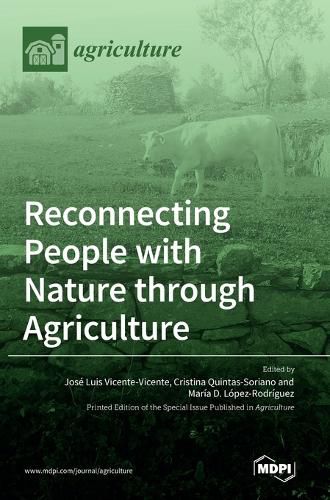Readings Newsletter
Become a Readings Member to make your shopping experience even easier.
Sign in or sign up for free!
You’re not far away from qualifying for FREE standard shipping within Australia
You’ve qualified for FREE standard shipping within Australia
The cart is loading…






This title is printed to order. This book may have been self-published. If so, we cannot guarantee the quality of the content. In the main most books will have gone through the editing process however some may not. We therefore suggest that you be aware of this before ordering this book. If in doubt check either the author or publisher’s details as we are unable to accept any returns unless they are faulty. Please contact us if you have any questions.
An increasing number of people live in cities. In recent decades, this, combined with rural abandonment and landscape polarisation, has resulted in high land ownership concentrations and agricultural intensification. This, in turn, has resulted in a significant decrease in the resilience of agriculture and overall food systems and threatens the maintenance of traditional indigenous and peasant farming. Therefore, there is an urgent need to reconnect society with the sustainable use of agroecosystems by fostering resilient social-ecological systems, emphasising the links between the functioning of natural systems and human well-being, and stressing the benefits that people derive from them. This Special Issue aims to highlight impactful research and commentaries that focus on attempts to connect people with nature for the promotion of sustainable agricultural transitions. This Issue embraces inter- and trans-disciplinary studies from multiple disciplines (e.g., agricultural sciences, environmental sciences, geography, economy, and sociology), as well as those incorporating other knowledge systems (e.g., local and indigenous) in the co-construction of knowledge for sustainable agriculture, including studies in rural areas (e.g., GIAHS or HNV farmland) and initiatives that address urban-rural relationships or those developed within metropolitan areas (e.g., community-supported agriculture, food hubs, domestic gardens, multifunctional agriculture, and farmers or consumers cooperatives) and studies assessing the societal and ecological impacts of those initiatives.
$9.00 standard shipping within Australia
FREE standard shipping within Australia for orders over $100.00
Express & International shipping calculated at checkout
This title is printed to order. This book may have been self-published. If so, we cannot guarantee the quality of the content. In the main most books will have gone through the editing process however some may not. We therefore suggest that you be aware of this before ordering this book. If in doubt check either the author or publisher’s details as we are unable to accept any returns unless they are faulty. Please contact us if you have any questions.
An increasing number of people live in cities. In recent decades, this, combined with rural abandonment and landscape polarisation, has resulted in high land ownership concentrations and agricultural intensification. This, in turn, has resulted in a significant decrease in the resilience of agriculture and overall food systems and threatens the maintenance of traditional indigenous and peasant farming. Therefore, there is an urgent need to reconnect society with the sustainable use of agroecosystems by fostering resilient social-ecological systems, emphasising the links between the functioning of natural systems and human well-being, and stressing the benefits that people derive from them. This Special Issue aims to highlight impactful research and commentaries that focus on attempts to connect people with nature for the promotion of sustainable agricultural transitions. This Issue embraces inter- and trans-disciplinary studies from multiple disciplines (e.g., agricultural sciences, environmental sciences, geography, economy, and sociology), as well as those incorporating other knowledge systems (e.g., local and indigenous) in the co-construction of knowledge for sustainable agriculture, including studies in rural areas (e.g., GIAHS or HNV farmland) and initiatives that address urban-rural relationships or those developed within metropolitan areas (e.g., community-supported agriculture, food hubs, domestic gardens, multifunctional agriculture, and farmers or consumers cooperatives) and studies assessing the societal and ecological impacts of those initiatives.